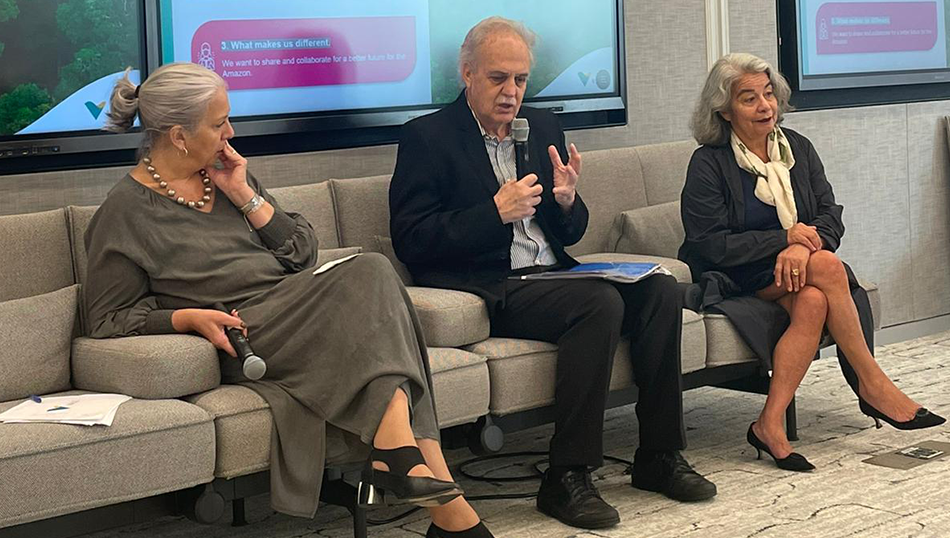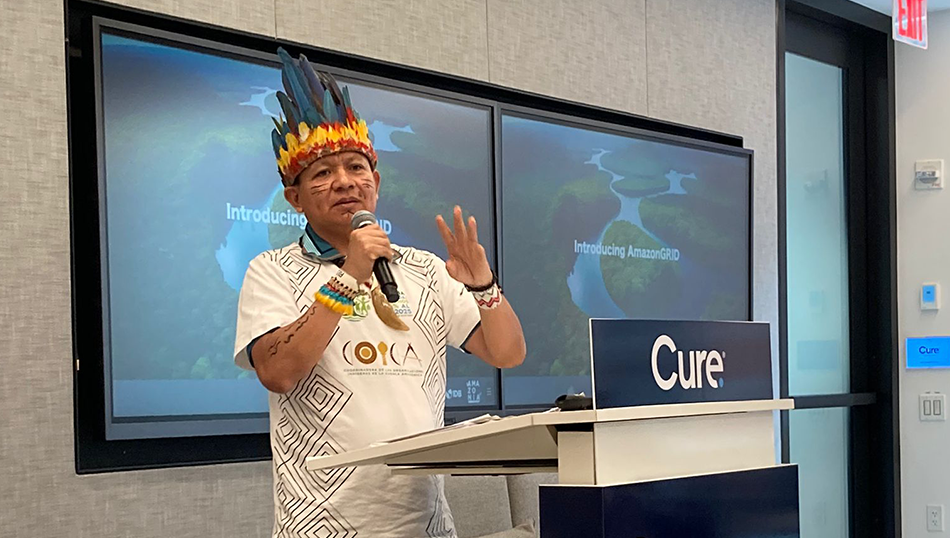A recap on the SPA events organized at the UNGA Science Summit, between September 19th to the 28th, 2023.
On the margins of the 78th session of the United Nations General Assembly (UNGA78) and the Science Summit, the Science Panel for the Amazon (SPA) convened several panels that brought together representatives from the finance sector, academia, and Indigenous Peoples and Local Communities’ (IPLC) leaders. The dialogues engaged on Amazon conservation, education, science, technology, innovation, sustainable bioeconomies, and the vital role IPLCs play in conserving the Amazon.
The inaugural event, “The Role of Education, Science, and Technology on the Survival of the Amazon,” took place on September 19 and featured the following panel of speakers:
- Emma Torres, SPA Strategic Coordinator, VP of the Americas and Head of the NY Office at SDSN.
- Carlos Nobre, SPA Co-Chair and Senior Researcher at the Institute of Advanced Studies at the University of Sao Paulo.
- Adalberto Val, Member of the SPA Science Steering Committee and Senior Researcher at the Brazilian National Institute for Research of the Amazon.
- María Luiza Paiva, Sustainability Executive Vice President at VALE.
- Lauro Barata, Professor and Senior Researcher at the University of Campinas and the University of Western Pará.
- João Meirelles, CEO and General Director of Peabiru Institute.
- Marco Ehrlich, Postgraduate Professor at Universidad El Bosque and former deputy director for science and technology at the Amazon Research Institute of Colombia.
- Francisco Apurinã, Business Administrator and Postdoctoral fellow from the University of Helsinki in Finland.
- Marielos Peña-Claros, SPA Co-Chair, Professor in Forest Ecology and Forest Management, and member of the Academic Council of Wageningen University.

Event “The Role of Education, Science, and Technology on the Survival of the Amazon”
at Cure Facilities, New York City, September 19, 2023.
Presentations highlighted the significance of education, training, and knowledge sharing for the conservation of the Amazon and for advancing nature-based sustainable solutions. The event also underlined the importance of integration of Indigenous knowledge and science and the promotion of a socio-bioeconomy for sustainable development.
Key messages from the event included:
- The need for integration of knowledge systems: The panel underscored the importance of integrating scientific knowledge with Indigenous and local knowledge (ILK).
- Investment in Education, Science and Technology are essential for understanding the vast richness of the Amazon and to transform knowledge into sustainable innovations to benefit the Amazonian population. The importance of establishing and connecting research and development hubs across the region was also emphasized.
- Access to quality education, technical training, and technological platforms is crucial for Amazon conservation and essential for strengthening capacities in Amazon communities.
- A transition to a socio-bioeconomy (i.e., through biofactories), while benefiting local communities. Carlos Nobre highlighted the importance of “new solutions to keep forests standing and alive, combining forest potentials with the newest technologies, and creating spaces for local business initiatives.”
The second event in the SPA Science Summit series, titled “Supporting Bioeconomies of a Healthy Standing Forest and Flowing Rivers in the Amazon,” took place on September 22. It was moderated by Roberto Waack, Member of the SPA Strategic Committee, Chairman of the Board of the Arapyaú Institute, and Co-founder of the initiative Uma Concertação pela Amazônia and of the Coalizão Brasil, Clima, Floresta e Agricultura. It engaged the following panelists:
- Emma Torres, SPA Strategic Coordinator, VP of the Americas and Head of the NY Office at SDSN.
- Carlos Nobre, SPA Co-Chair and Senior Researcher at the Institute of Advanced Studies at University of Sao Paulo.
- Rachael Garrett, SPA Lead Author and Professor at the University of Cambridge.
- Ana Euler, SPA Author and Business Executive Director of Embrapa
- Ana María González Velosa, Coordinator of the Amazon Sustainable Landscapes Program at the World Bank.
- Yves Lesenfants, Sustainability & Inclusion Senior Specialist at the Inter-American Development Bank.
- Gregorio Mirabal, Member of the SPA Strategic Committee and Climate Change and Biodiversity coordinator at COICA.
- Marco van der Ree, Founding Board Member and currently the interim Executive Director for Conexsus in Brazil.
The panelists explored challenges and opportunities to advance Amazonian bioeconomies. Deforestation and degradation have often been justified on account of generating economic benefits, despite limited evidence of generating inclusive development, noted Rachael Garrett. The panel discussed an alternative sustainable path forward.
The SPA Bioeconomy Policy Brief, released during the Amazon Presidents’ Summit in August 2023, served as a background for the discussions. Below are key messages of the exchange:
- The need to establish safeguards against the misuse of the bioeconomy concept. Socio-bioeconomies are based around the sustainable use and restoration of healthy standing forests and flowing rivers and support the well-being, knowledge, rights, and territories of Indigenous Peoples and local communities.
- Land tenure security, access to public policies, long term partnerships, and ethical markets are key factors to scale up the socio-bioeconomies in the Amazon.
- Balancing sustainable development and conservation. The discussions emphasized the urgency of adopting sustainable bioeconomic practices that both stimulate economic growth and conserve the Amazon’s natural resources. Structural changes centered on justice, diversity, and inclusivity are required to achieve this.
- The need to establish inclusive and participatory socio-bioeconomy planning and collaborative implementation processes that builds on IPLC knowledge and institutions and respect their rights. The panel underscored the importance of strengthening capacities in local communities through tools, knowledge exchange, and opportunities to actively participate in and benefit from the bioeconomic activities. Opportunities presented by hundreds of socio-bioeconomy initiatives in IPLC territories at different planning and ideation stages were emphasized.
- Biodiversity conservation. Panelists highlighted that responsible bioeconomic practices are a vital part of safeguarding the region’s unique biodiversity. These could be supported by comprehensive geospatial analysis tools that support strategic decisions, facilitate information exchange, and encourage investments.
- Finance is essential for scaling up bioeconomy in conjunction with a broader enabling environment including governance, traceability systems, and partnerships. Innovative financial instruments that leverage private markets, such as bonds with returns to conservation and risk mitigation, provide opportunities to increase financing for bioeconomy. Blended finance instruments, using guarantees, grants, and other de-risking instruments to mobilize private capital which could be deployed on concessional terms, were also highlighted.

Gregorio Mirabal at the event “Supporting Bioeconomies of a Healthy Standing Forest and Flowing Rivers in the Amazon” at Cure Facilities, New York City, September 22, 2023.
In summary, the panel made a case that socio-bioeconomies of healthy standing forests and flowing rivers are essential for the future of the Amazon and its populations, including IPLCs; and emphasized that collaboration, financing, and sustainable infrastructure are crucial enablers for upscaling socio-bioeconomies.
As Gregorio Mirabal (COICA) stated: “The big challenge in the Amazon is to implement an economy that respects the rights of the rainforest and the rights of the Indigenous Peoples.”
SPA’s third event “The Role of Indigenous Peoples and Local Communities in Conserving the Amazon and Preventing Tipping Points,” took place online on September 28. Discussions revolved around deforestation trends, threats to IPLCs, the importance of Indigenous Territories as barriers against deforestation, and opportunities for collaborative solutions. Marielos Peña-Claros, SPA Co-Chair, Professor in Forest Ecology and Forest Management, and member of the Academic Council of Wageningen University, moderated the event, that featured the following speakers:
- Luciana Gatti, SPA Lead Author and Researcher at the National Institute for Space Research of Brazil (INPE).
- Carmen Josse, SPA Lead Author and Executive Director at Fundación EcoCiencia.
- Ane Alencar, SPA Lead Author and Science Director at Amazon Institute of Environmental Studies (IPAM).
- Gasodá Surui, SPA Author and Coordinator of the Indigenous Cultural Center Wagôh Pakob.
- Lilian Painter, SPA Lead Author and Director of the Bolivia Program at Wildlife Conservation Society (WCS).
- André Baniwa, SPA Lead Author and Director at the Land Demarcation Department of the Brazilian Ministry of Indigenous Peoples.
The discussions during this event were enlightening and shed light on critical aspects of Amazon conservation and Indigenous land management. Key themes addressed included:
- Deforestation and tipping points: the event highlighted the alarming trends of deforestation and environmental degradation in the Amazon. Urgent action is needed to prevent further deforestation and loss of the Amazon as a carbon sink.
- The critical role of Indigenous Peoples in conserving the Amazon, taking into consideration that Indigenous Territories (ITs) cover more than a quarter of the Amazon. ITs show significantly lower deforestation than all other land tenure categories, serving as important buffers against climate change and biodiversity loss, and emerging as crucial barriers against deforestation (read more on our Policy Brief).
- The important role of policy and enforcement for a sustainable future, considering that demarcated ITs have significantly less deforestation than unrecognized lands.
- Challenges and opportunities: the event acknowledged the immense threats faced by IPLCs, including land invasions, illegal logging, mining, and other forms of exploitation. Nevertheless, there were notable opportunities highlighted as solutions, such as The Indigenous Cultural Center Wagôh Pakob, mentioned by Gasodá Surui, that serves as a platform to value the Surui Culture and foster dialogue between Indigenous peoples, scientists and tourists, while also focusing on territory monitoring and protection. Another relevant topic that was mentioned, was the importance of Life Plans and Management Plans, as a way to strengthen territorial governance.
- Collaborative Research: the event also discussed collaborative research between scientists and Indigenous peoples. This collaboration has yielded valuable results, including monitoring initiatives, advocacy efforts, and tools like “Alerta Clima Indígena” (“Indigenous Climate Alert”), as stated by Ane Alencar.
Despite facing many threats, Indigenous peoples and local communities demonstrate autonomy and resilience. It’s essential to support their self-governance and management efforts by recognizing Indigenous rights, demarcating Indigenous territories, supporting sustainable management plans, promoting adequate funding for land management and protection, and addressing the urgent need to protect Indigenous territories and their invaluable contributions to Amazon conservation.
The SPA’s presence at the UNGA78 Science Summit brought attention to the critical issues facing the Amazon and advocated for concrete actions. Through education, science, and collaboration, the SPA has demonstrated the power of collective efforts in safeguarding this vital region.
